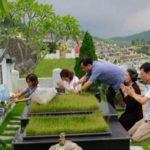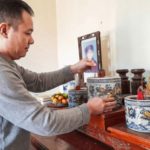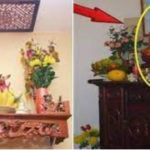In traditional culture, paying respects to ancestors by tomb-sweeping is considered important. Our forefathers would visit the graves of their loved ones a few times a year, especially during Tet, death anniversaries, Thanh Minh, and the day of forgiving the dead.
It was also deemed respectful to invite elderly relatives to important family events, especially when hosting esteemed guests. However, there is a caveat: those aged 80 and above are advised against visiting graves, and those in their 70s, while they may still pay visits, are discouraged from staying overnight. But why?
The 80-year-old threshold: Avoiding the graves
At 80, one is closer to heaven, and their health may be frail, making them susceptible to negative spiritual influences. Additionally, with weakening eyesight and unsteady gait, navigating uneven, grassy, and muddy terrain around old graveyards becomes a safety hazard, increasing the risk of falls and subsequent bone fractures, which are challenging to heal at this age.
The heavy negative spiritual energy in cemeteries can also take a toll on the elderly, potentially leading to health issues. With diminished energy at 80, they become more susceptible to spiritual attachments and disturbances, especially as thoughts of mortality loom larger.
Thus, our ancestors wisely advised against graveyard visits for octogenarians, recommending rest and relaxation at home instead.
The 70-year-old threshold: No overnight stays
While a brief visit may be manageable, spending the night elsewhere becomes a challenge at 70. Sleep often eludes the elderly, and they are more prone to age-related health issues. A comfortable bed is crucial, and an unfamiliar one can disrupt sleep further.
Older adults also tend to wake up frequently during the night to use the bathroom, and doing so in an unfamiliar setting can be inconvenient and uncomfortable for both the guest and the host. Any health emergencies would be more challenging to manage due to unfamiliarity with the surroundings, lack of access to regular medication, and the host’s potential lack of knowledge about the guest’s health conditions and routines.
Therefore, it is generally advised that 70-year-olds return home after a short visit, maintaining their regular routines and having their specific needs attended to by family members who understand them well.

While tomb-sweeping is a beautiful tradition, the elderly should refrain from participating due to safety concerns.
Additionally, death can come knocking at any moment at this age, and it would be unfortunate for both the guest and the host if something untoward were to happen during the stay. The host would bear the burden of blame and negative spiritual energy, while the guest might regret not passing away in the comfort of their own home, which was considered important in traditional funeral practices.
What about today?
Today, 70 and 80 are still considered elderly, even with increased life expectancies. However, some exceptionally healthy individuals in this age group may choose to disregard these traditional advisories. Modern cemeteries are also more accessible and well-maintained, making it possible for older adults to pay their respects, although it is advisable to avoid visiting too early or too late in the day.
Regarding overnight stays, the discomfort of sleeping in an unfamiliar place remains a valid concern across time. Ultimately, the decision to follow these traditional guidelines depends on one’s health, comfort level, and personal preferences.
This information is based on experiential observations.
“Prayers for Tomb Sweeping on Vietnamese New Year: Preserving Cultural Traditions”
Year-end tomb-sweeping is a unique Vietnamese tradition. This guide will detail the rituals and offer a standard set of prayers for this customary event.



































